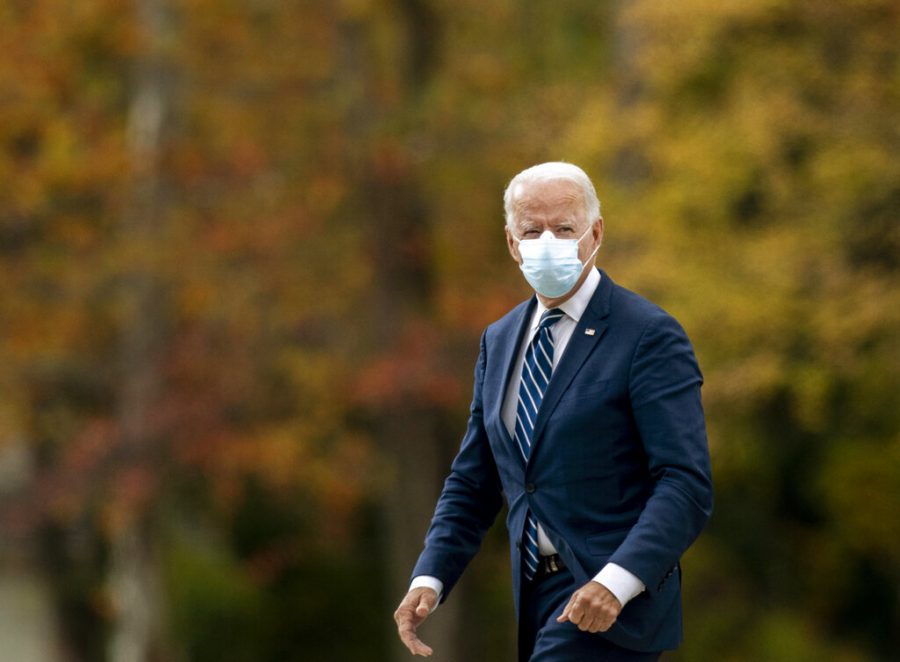Biden flips 2 Illinois counties as Democrats lose 3 state House seats
Democratic presidential candidate former Vice President Joe Biden looks to supporters and members of the press while arriving to a campaign event Friday, Oct. 16. 2020 in Southfield, Mich. (Nicole Hester/Ann Arbor News via AP)
President-elect Joe Biden flipped McClean and Kendall Counties, while in down-ballot races, Republicans picked up three seats in the Illinois State House of Representatives.
In the Illinois legislative races, Republican challenger Chris Bos defeated incumbent Democrat Rep. Mary Edly-Allen in District 51. Republican Amy Elik won District 111 over incumbent Democrat Monica Bristow. And in District 116, incumbent Democratic state Rep. Nathan Reitz lost his seat to Republican David Friess.
The election results contradicted the “blue wave” that was expected to sweep congressional and legislative races.
While the Democratic party wasn’t able to sway voters to the left in many House and Senate races, Biden was quite successful among some Republican and swing voters who voted for him based on his character and moderate stance.
“I was raised by a conservative dad, and despite going to a very very liberal college and learning a lot about the Democrat perspective, I’ve always believed that free trade, low taxes, strong defense and gun rights are good,” said Connor Metz, a registered Republican from Boston who voted for Biden. “But I knew that Trump was unfit for office and would be a disaster for this country.”
In the U.S. House of Representatives, Democrats remain in control after losing eight seats. Democrats currently hold 222 seats, marking the slimmest majority control of the House since World War II.
These largely unexpected results left Democrats scrambling for answers despite a win in the presidential race. In a post-election caucus meeting by telephone, Democrats were quick to blame one another for the disappointing results.
Rep. Conor Lamb thinks that some progressive policies and perspectives are damaging the Democratic party’s reputation.
“I’m giving you an honest account of what I’m hearing from my own constituents, which is that they are extremely frustrated by the message of defunding the police and banning fracking,” Lamb told The New York Times. “And I, as a Democrat, am just as frustrated.”
Rep. Alexandra Ocasio-Cortez rejected the idea espoused by some Democratic legislators that progressive proposals such as “Medicare for all” should be blamed for Democratic losses. She told The New York Times that a lack of canvassing and digital organizing hurt the party more.
This election was a reverse coattail on Trump and Biden, according to Kent Redfield, professor emeritus of political science at the University of Illinois at Springfield. A coattail effect is the tendency for a popular political party leader to attract votes for other candidates of the same party in an election.
“This is a personal rejection of the president and not necessarily the party,” Redfield said. “Trump pissed a lot of people off, but it wasn’t enough to get a strong progressive push.”
Center-right leaning voter Mark Mendoza, 24, who voted for Trump in 2016 but switched to Biden in 2020, said he doesn’t like the far-left progressives in Congress because he believes they are not working with the rest of the Democratic party. “They are dividing the party and not working together to a compromise,” Mendoza said. “And their policies are not realistic.”
Redfield said these congressional losses for Democrats despite a win for Biden could be explained by a desire among moderate and conservative voters to prevent Biden from enabling far-left candidates. “Conservative voters who voted for Biden may have voted for Republican candidates [in congressional races] because they don’t want Biden giving socialist candidates free reign,” Redfield said. “The voters wanted checks and balances.”
Mendoza voted in favor of the “fair tax” amendment to the Illinois constitution and voted Republican for all other races.
“I voted Republican for the rest of the races because the state of Illinois has a lot of corrupt politicians and I’m fed up with Democrats in Springfield,” Mendoza said.
Statewide Democratic voter dissatisfaction may have peaked this year after Illinois House Speaker Michael Madigan was linked to a bribery scheme involving ComEd.
In the 13th Congressional District, Democratic challenger Betsy Londrigran was strongly linked to Madigan through ads by incumbent Republican Rodney Davis. Londrigan lost to Davis by 2000 votes in 2018. In 2020, she lost by more than 29,000 votes despite her campaign’s focus on healthcare during a pandemic.
Democrats began to publicly turn on Madigan over the summer but accelerated after the election to deny him his title in January, which he has held since 1983. There are now 17 Democrats in the State House of Representatives who say they won’t vote for Madigan. With 73 Democrats in the House, he wouldn’t get the 60 needed to hang on.
Illinois is also facing a ballooning budget deficit and bill backlog for the next five years. Gov. J.B. Pritzker was hoping to help the budget by changing the state’s flat-rate income tax with a graduated system, but voters rejected the amendment.
The results are out and the pandemic didn’t stop the people from making their voices heard and casting their votes. As the election results continue to solidify l and more district and county demographic data is released, both parties are expected to do more soul-searching to strengthen their platforms and garner support from moderate and swing-voters.







